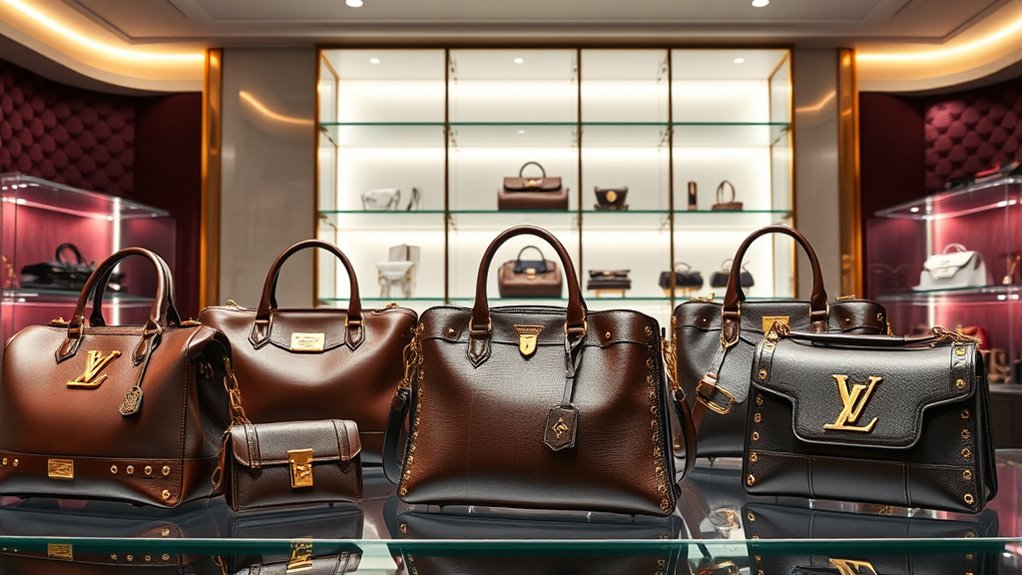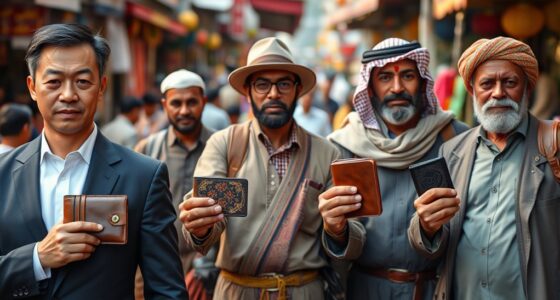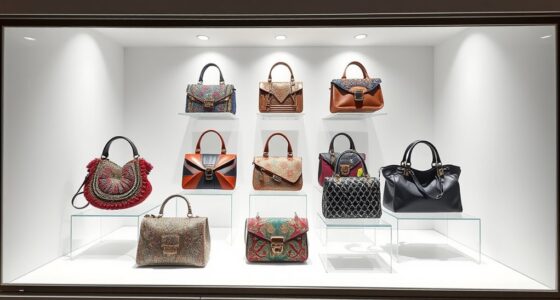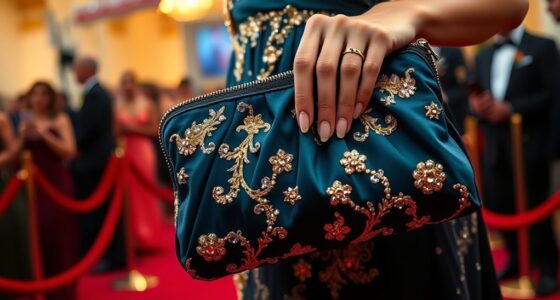Handbags became symbols of status in modern society through a mix of luxury branding, craftsmanship, and celebrity influence. When designers create exclusive pieces with recognizable logos or limited editions, they appeal to aspirations of success. Celebrities wearing designer bags on social media and at events boost their desirability and social power. Over time, handbags transformed from practical accessories into symbols of wealth and cultural capital. Exploring further reveals how these trends shape social perceptions and personal identity.
Key Takeaways
- Luxury brands craft exclusive, recognizable handbags that symbolize wealth and social status.
- Celebrity endorsements and fashion trends elevate handbags into cultural symbols of success.
- Handbags serve as visual indicators of financial stability and personal achievement.
- Limited editions and signature logos create scarcity, enhancing their prestige and desirability.
- Historically, handbags have evolved from practical accessories to icons representing social hierarchy.
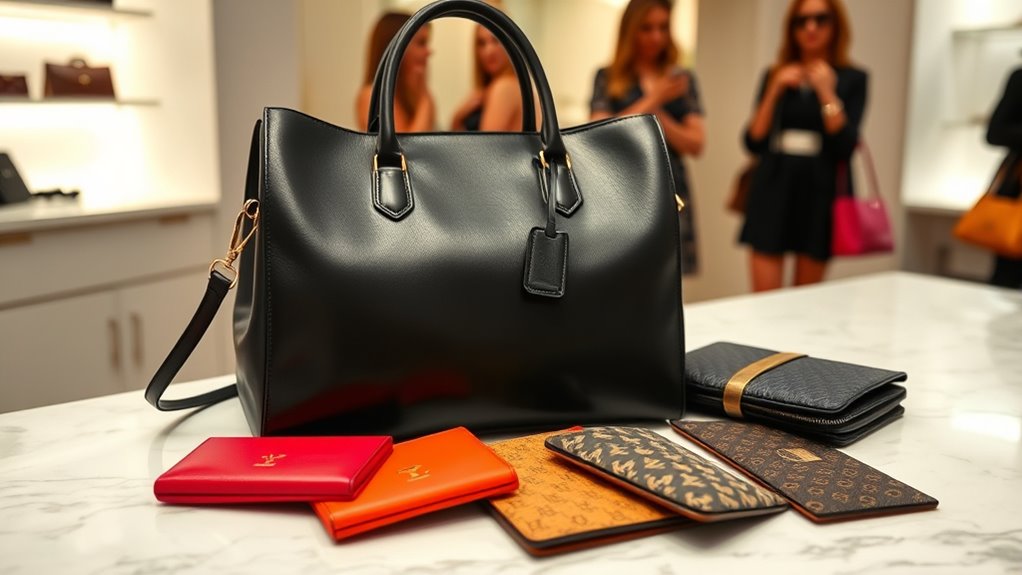
Handbags have long been more than just practical accessories; they serve as powerful symbols of status and social standing. Today, their significance extends beyond utility into the domain of luxury branding and fashion influence. When you carry a designer handbag, you’re not just holding a bag—you’re making a statement about your taste, your success, and your place in society. Luxury brands have mastered the art of creating handbags that are instantly recognizable, often infused with exclusivity and craftsmanship that elevate them above mass-market options. These brands carefully cultivate an image that appeals to aspirational consumers who want to showcase their achievements and align themselves with a particular lifestyle.
Handbags symbolize status, success, and sophisticated taste through luxury branding and craftsmanship.
The influence of fashion trends plays a pivotal role in shaping why handbags have become such coveted symbols. High-profile runway shows, celebrity endorsements, and social media hype all contribute to the allure of owning a luxury handbag. When a celebrity steps out with a limited-edition purse, it sparks a desire among fans and followers to emulate that style, reinforcing the handbag’s status as a symbol of sophistication and influence. You find yourself drawn to these pieces not just because of their design, but because they carry the weight of cultural relevance and social validation.
Luxury branding heightens this effect by creating a sense of scarcity and prestige. Limited releases, signature logos, and collaborations with influential artists or designers make these handbags highly desirable. The investment in a high-end handbag often signifies more than just fashion; it signifies financial stability and a keen eye for quality. When you own such a piece, it signals to others that you value craftsmanship and exclusivity, setting you apart in social circles where image matters.
Fashion influence extends beyond individual preferences to shape societal perceptions of success. Owning a luxury handbag can serve as a subtle yet powerful display of achievement, distinguishing you from those who settle for lesser brands. It becomes a visual shorthand for your accomplishments, taste, and social position. Over time, these bags have evolved from mere accessories to symbols of identity, status, and cultural capital. Recognizing the history of luxury branding helps us understand how these items have become embedded in societal notions of success. Whether in professional environments or social gatherings, carrying a luxury handbag helps communicate your standing without saying a word. In this way, handbags have solidified their role as enduring emblems of status within modern society, driven by the forces of luxury branding and ongoing fashion influence.
Frequently Asked Questions
How Do Handbag Brands Influence Social Class Perceptions?
Handbag brands influence social class perceptions through luxury branding that signals wealth and exclusivity. When you carry designer bags, you’re perceived as part of the higher social hierarchy, showcasing status and refined taste. These brands create aspirational images, making it clear who belongs to which social class. By associating certain handbags with prestige, they reinforce societal divisions and elevate your perceived social standing, strengthening the link between luxury and status.
What Are the Most Expensive Handbags Ever Sold?
You might be amazed to learn that the most expensive handbag ever sold is a $3.8 million Hermès Himalaya Birkin, a masterpiece of luxury branding. In collector markets, this bag’s rarity and craftsmanship turn it into a symbol of ultimate wealth. Its value skyrocket because discerning collectors see it as more than an accessory—it’s a status statement that elevates your social standing to legendary heights.
How Has Social Media Impacted Handbag Status Symbols?
Social media has amplified handbag status symbols by making celebrity endorsements and hashtag campaigns highly influential. When you see your favorite celebrity sporting a luxury bag, you’re more likely to desire it, fueling trends. Hashtags like #baggoals or #luxurylifestyle create buzz, making these handbags symbols of wealth and style. This direct exposure accelerates the desirability and status associated with owning certain high-end bags, shaping modern perceptions of luxury.
Do Handbag Trends Vary Across Cultures?
Imagine a tapestry woven with diverse threads—handbag trends do vary across cultures. You’ll notice cultural symbolism influences styles, colors, and brands, reflecting local values and traditions. Handbag globalization spreads iconic designs worldwide, yet local nuances remain vibrant. You see, each culture adds its unique stitch, making trends both universal and distinctly regional. So, your handbag choices often mirror cultural stories, blending global influence with local identity seamlessly.
Are Vintage Handbags More Valuable Than New Designer Bags?
Vintage handbags often hold more value than new designer bags because of their vintage appeal and rarity. You can find that vintage appeal adds a unique charm that modern bags can’t replicate, making them highly desirable to collectors. Brand desirability also plays a role; iconic brands increase a vintage bag’s worth. So, if you’re after timeless style and investment potential, vintage handbags generally prove more valuable than new ones.
Conclusion
Think of handbags as your personal crown, a symbol that proclaims your place in society’s grand palace. Just as a crown signifies authority and prestige, your handbag reveals your status and style. When you carry that designer piece, you’re not just holding a bag—you’re holding a story, a symbol of achievement. Remember, in this social kingdom, your handbag is the emblem that speaks volumes about who you are and what you’ve earned.
